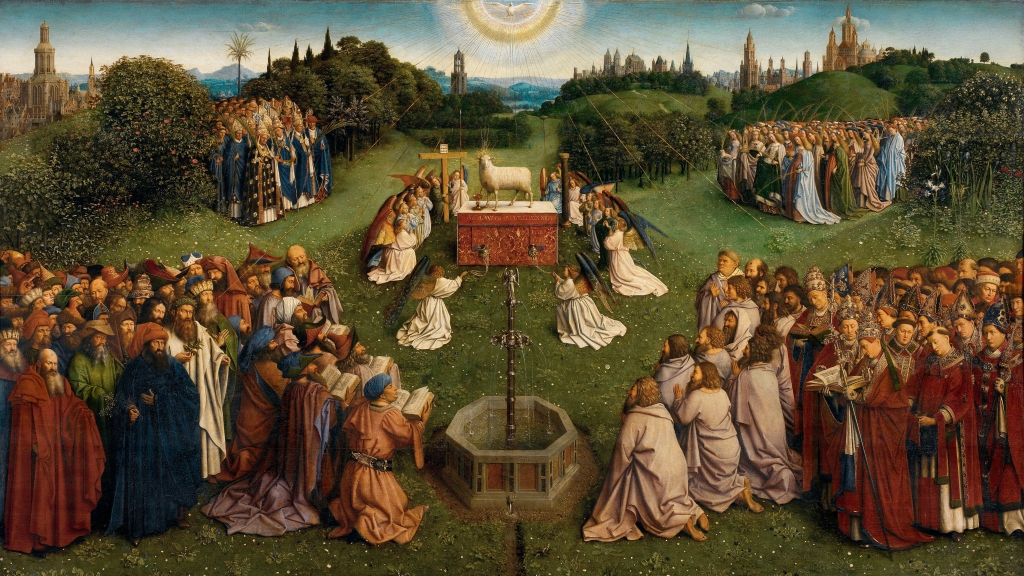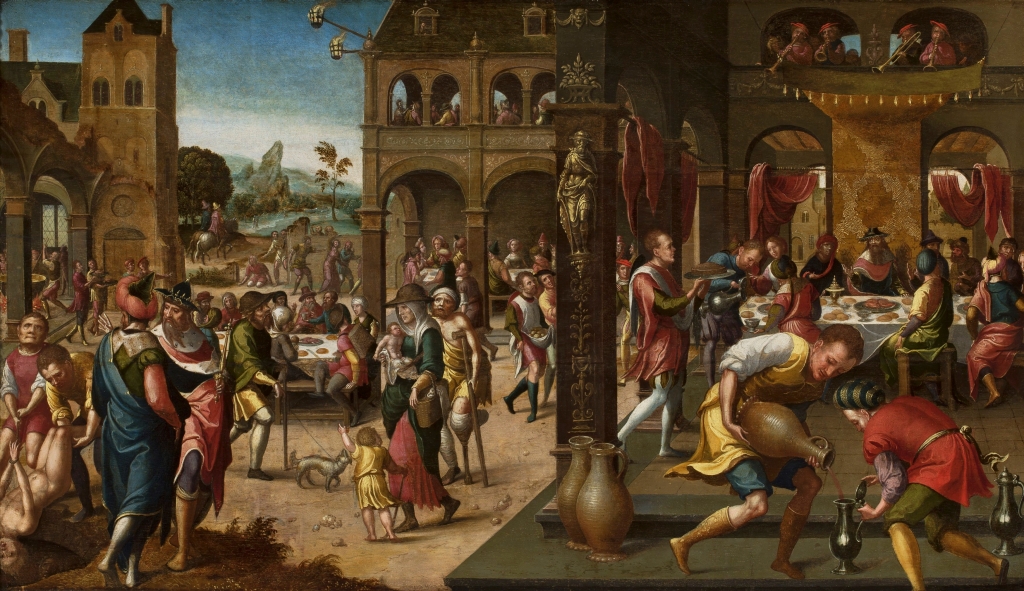
Originally preached at Messiah Evangelical Lutheran Church, East Setauket, New York.
Grace, mercy, and peace from God our Father, and our Lord and Savior, Jesus Christ.
Do any of you remember an ad campaign for Snickers bars that featured historical figures driving around in a compact car, inviting their friends to join them on their roadtrip with a proffered Snickers bar and the spoken invitation, “Feast?” A Snickers bar isn’t much of a feast, though I suppose for some it might seem like it after a long day with few calories, or no food for days. But a feast? A feast looks a lot more like what which the prophet Isaiah describes in our Old Testament reading this morning: “On this mountain the Lord of hosts will make for all peoples, a feast of rich food, a feast of well-aged wine, of rich food full of marrow, of aged wine well refined.”
Now that’s a feast! God promises meat, wine, and rich and hearty foods (never let it be said that God is a vegetarian). A meal, fatty, proteinaceous and full of calories. Tables overflowing with special foods that you only get to eat once in a while, maybe once in a lifetime. Perhaps a feast like that in Gabriel Axel’s film, Babette’s Feast. In the film, Babette, a housekeeper, wins the Paris lottery and throws a feast of thanks for her employers, featuring a menu overflowing with dishes like turtle soup, blintzes, “quails in a sarcophagus,” endives, fruit with rum and cream, and cheese, all paired with fine wines, Amontillado sherry, and coffee and cognac. That’s a feast! I wouldn’t be all that excited if someone held up a Snickers bar to me and invited me to partake of it, but if someone invited me to a feast like Babette’s 10,000 Franc extravaganza, well, I think I would—it would be a meal to die for.
But the feast described in Isaiah is greater than any sort of earthly feasts we can think of, even the 10,000 Franc supper that Babette makes for her friends, because it’s an eschatological feast. It’s the feast at the end of time, the inaugural feast of a new age, the Wedding Feast of the Lamb, where Christ and the Church are made one, where Christ the Bridegroom marries the Church, his Bride. This is that feast which is seen by John in Revelation 19:
“Then I heard what seemed to be the voice of a great multitude, like the roar of many waters and like the sound of mighty peals of thunder, crying out,
‘Hallelujah!
For the Lord our God the Almighty reigns.
Let us rejoice and exult and give him the glory,
For the Marriage of the Lamb has come, and his Bride has made herself ready;
It was granted her to clothe herself with fine linen, bright and pure’–
for the fine linen is the righteous deeds of the saints.
And the angel said to me, ‘Write this: Blessed are those who are invited to the marriage supper of the Lamb.’ And he said to me, ‘These are the true words of God.’” (Rev 19:6-10)
This is the feast–the victory feast, no less–of our God, and it’s the one to which he invites everyone. It is the feast at which all tears will be wiped away from our eyes, where death will be swallowed up forever. And what a glorious feast it is!
So how does this feast, this marriage supper of the Lamb, figure into the parable Jesus tells us today? Jesus says that the kingdom of God is like a king who throws a wedding feast for his son and invites many people to the party. But they won’t come, even when the king entreats them with a description of the repast to be enjoyed. “See,” he says, “I have prepared my dinner, my oxen and my fat calves have been slaughtered, and everything is ready. Come to the wedding feast.” Instead of coming, the invitation is ignored, and in some cases, the messengers delivering the invitation are killed. The king, outraged, kills those people who killed his messengers, and sends out the invitation to new people, sending his servants out to scour the highways and byways for anyone and everyone who would come, both the “good and the bad.” It didn’t matter who they were–come to the feast!
And they all come, and the king is pleased. Everyone present is dressed for the occasion and ready for the feast, except for one. The king is displeased—”How did you get in here without a wedding garment?” he asks the man. The man has no explanation for why he wasn’t dressed properly. But in doing so, he dishonored the king and his invitation, and so the king had him bound, hand and foot, and thrown out of the feast into the outer darkness where there is weeping and gnashing of teeth. Jesus ends the parable: “For many are called, but few are chosen.”

So the Marriage Feast of the Lamb is described here in Jesus’ parable. God, the king in this parable, invited his Old Testament people to trust in him for the forgiveness of their sins. He invited them to be his people, and he would be their God. But they rejected him and his invitation; they ignored his servants, the prophets, and in some cases, killed them. So God cut them off, and he extended the same invitation to a new group of people who would heed his call, both the good and the bad. The new guests are those who have heard about what God has done in Christ and have heeded the call, regardless of who they are or what they have done. They all come to the feast, to rejoice and exult and give the Lamb glory. The feast of rich foods, full of marrow, where God will swallow up death forever, and tears will be no more.
So who is invited to this feast? We are! We have all been invited to join in the marriage feast of the Lamb. Every one of us here has been invited. Jesus died and rose again, and extended the invitation to you to be a part of the Church, the Bride of Christ, and to come to the feast. And so we’re here, heeding the invitation. God has called us all, saints and sinners alike, to join the feast and celebrate the ending of sin, death, and hell. But how do we know that we won’t be cast out of the feast like the one man who didn’t have a wedding garment? What is the wedding garment, and why is it important?

Put succinctly, we know that we are invited to the feast because we trust in what Jesus has done for us. When we were dead in sin, we were enemies of God. We weren’t in a covenant relationship with him, where we would be his people and he would be our God, where he would save us from the power of sin, death, and evil in this world. We did as we pleased, we made gods of our own wills and desires rather than acknowledging the will of and trusting in our Maker. As a result, we were doomed to suffer the consequences of our sin and to die. But when Jesus took the sins of the world on himself and buried them forever in the tomb, God invited us all to the feast, regardless of who we are, the good and the bad, because the sin that keeps us from the feast has been taken away. When we see what Jesus has done and trust that his saving work was for us, we can both acknowledge our invitation to the feast and know that we have been invited as guests. Moreover, when we trust in the saving work of Jesus to deliver us from our own personal sins, we receive the wedding garment that we need to be worthy to attend the feast. We are clothed in the grace of Jesus when we trust in him, and so we are dressed for the occasion, arrayed in that fine linen of the eschatological, or end, vision, because how else can the saints do good deeds unless those deeds are made good in Christ? Because we trust God’s word and trust in what Jesus has done, we won’t be cast out of the wedding feast. The man who was cast out, in the parable, was not arrayed in Christ’s grace and righteousness. He did not believe and did not trust in God for his salvation. He may have wanted to have the benefits of Jesus’ sacrifice, but he seems to have not really trusted in Jesus’ work. Thus, he was thrown out. You cannot trust in something or someone other than God for this salvation; otherwise, you worship a new idol and lose the promise. But for those who trust in him, there is a great spread with much rejoicing and the end of all sadness.

Brothers and sisters, you and I are invited to the Feast of the Lamb, and we who trust in him for our salvation are made acceptable and ready for participation in it, clothed and made presentable before God in the righteousness of Christ. And here is an even greater thing–you and I participate in a foretaste of this coming feast every Sunday here at the altar! When we receive the Eucharist in the Lord’s Supper, we are participating in what one might call a “rehearsal dinner” for the final Feast of the Lamb. We rehearse and prepare for the last day, receiving Christ’s benefits through the Supper in his Body and Blood, given and shed for us. You know how we (usually) sing “Lamb of God, you take away the sin of the world, have mercy on us”? We’re acknowledging the present, physical Christ among us on the altar in the sacrament. We are rehearsing our union with Christ and the whole Church in coming to meet him and receive him at the altar. And we are made worthy to partake in this foretaste of the feast to come in our faith in Jesus and what he has done for us. We can partake because we believe that he has indeed given us his body and blood in this sacrament for our good. This is also why St. Paul encourages us to make sure that we discern Christ’s body and blood in the Sacrament, lest we not trust in him and make ourselves unworthy. But when we do trust his words and what he has done for us, we partake in that greater feast, greater than any feast that 10,000 Francs could buy (or more!). A feast that feeds not only the body, but the spirit. A feast which not only nourishes, but gives life. My brothers and sisters, the King has invited us. Come, let us go to the feast! Amen.